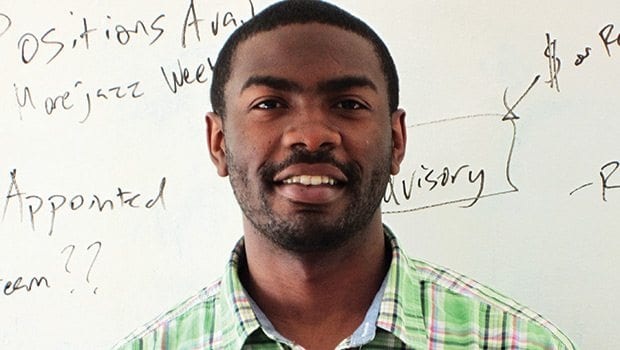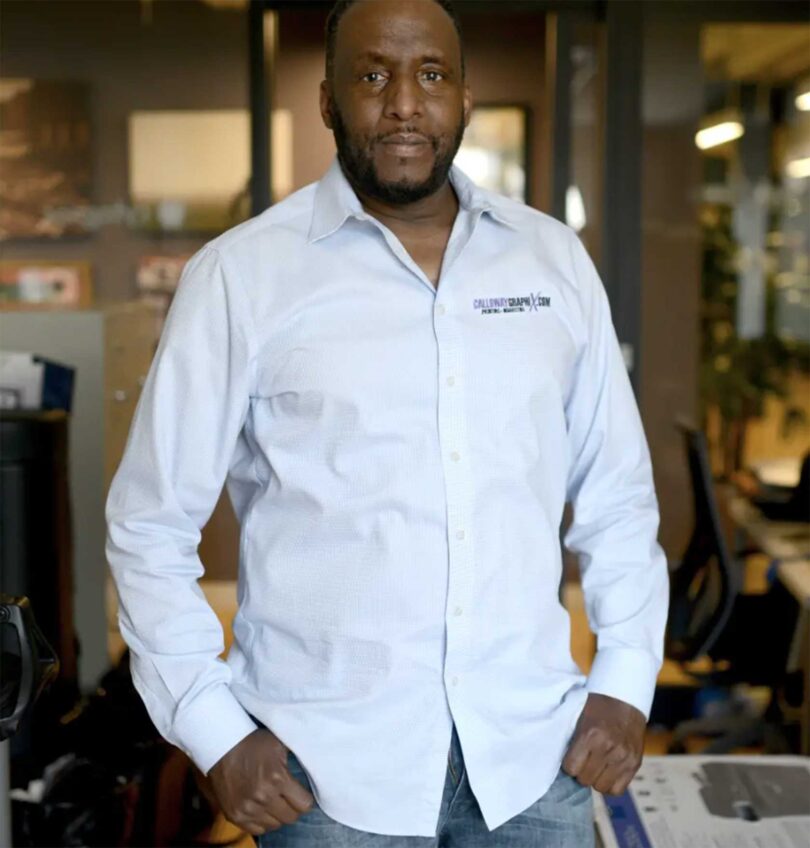
Those who support Boston’s entrepreneurial ecosystem have been working hard to develop a startup environment — particularly in the city’s neighborhoods — to attract young, bright and diverse minds to develop their own ventures. Rashad Sanders is an example of how this approach might actually be working.
The South Carolina native now lives in Jamaica Plain and is drawing on the city’s various startup support organizations, including District Hall in the Innovation District, the Downtown-based Startup Institute and Smarter in the City in Dudley Square, to get his young company Loadlytics off the ground. Loadlytics is developing a web-based dispatch management system that allows trucking companies to increase the effectiveness and efficiency of operations.
A 2012 University of Tennessee graduate, with a degree in supply chain management and logistics, Sanders worked in North Carolina and then spent time at the New York office of the Startup Institute before coming to Boston in early 2014.
While Sanders said he had a good experience in New York, he also made some connections with the Boston startup scene — the Startup Institute has an office in Boston as well — and felt it would be a good place to launch new business ventures.
He took a marketing and sales job with Joust, a Boston-based (and now defunct) startup that made customer service software. He then took a sales job with another Boston startup called NutraClick, which is developing health and wellness products.
But all the while, Sanders was formulating plans to launch his own business.
The startup gamble is a tough one. Sanders knows that, having seen Joust fail after less than a year with the company. But Loadlytics has a chance to find success evoking successful startups that bring new technology to a traditional bricks-and-mortar industry.
And it’s hard to get more traditional than trucking.
Sanders also has a self-professed, lifelong interest in trucks and trucking. His grandfather was a long-haul tractor trailer driver, so he was introduced to the work and the mechanics of trucks and trucking from an early age.
Immediately after college, Sanders also took a job as a driver manager at Celadon Trucking in North Carolina, where he worked for about a year.
What he saw was an industry that was reliant on the old way of doing things and had very little integration of technology to make job processes better and more efficient — especially the small trucking companies.
“When I looked closely at it and realized that the majority of trucking companies — about 96 percent — are small trucking companies, I began to see an industry that was very driven by small business that did not have access to the same level of technology and data that bigger trucking companies had access to,” Sanders said.
Boosting the bottom line
His goal is to make operational software that a small trucking company can afford and use to ship more stuff per truck to more locations. If it sounds simple, it’s because it is, yet that’s exactly what most trucking companies don’t have. With miniscule industry profit margins — the cost of gas being a major profit suck — most only make about four cents on the dollar, so any slight efficiency gain does impact an already meager bottom line.
“To start at that base level and try to teach them to be more efficient operationally would be a good place to start,” Sanders said. “Trucking companies have to find a more efficient way to squeeze money out of these loads, so if I can create some type of software that can help them be a little more proactive at looking at these different key metrics, then I think that will help them.”
He isn’t the only one who thinks so. Using his prior contacts in the trucking industry, Sanders has run what he is trying to do by some industry insiders and they are all very interested in what Loadlytics is developing, especially if the cost is affordable.
Loadlytics’ business model will be to sell the software as a service, which means users will pay an ongoing subscription fee for using the product. Sanders knows the price point for trucking companies will be crucial so he is examining very closely how much it should cost and just how to structure the payment details. He said the subscription is very likely to be per-truck.
The software system will be Web-based, including a mobile application, with the aim of making it as easy to use as possible for the trucking companies.
Not a tech guy, Sanders has scored big by digging into Boston’s technology scene to connect with some developers and designers who are helping him create Loadlytics software.
His status as a first-time entrepreneur comes with challenges, but he said things are going well and that Boston startup support organizations have helped greatly.
Plus, there’s been lots of learning by trial and error on crucial business functions such as operations, managing a team and product marketing.
“I would say I learned more starting a business in these last few months than I learned all through college,” Sanders said. “There is just so much you don’t think about.”






